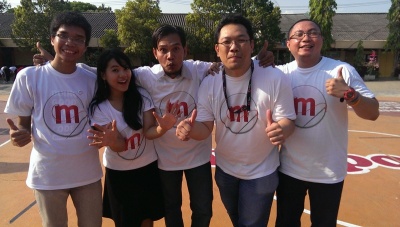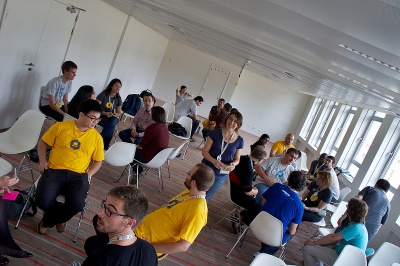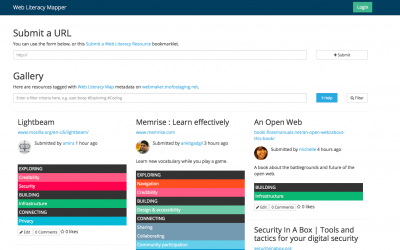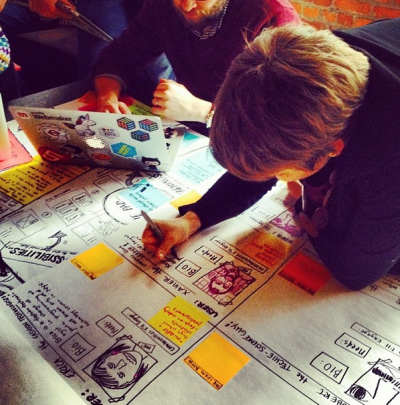Webmaker/Testing
Come betatest!
This round of betatesting runs from March 6 - May 10. If there's something you'd like to add to our test calendar, email teachtheweb@mozillafoundation.org
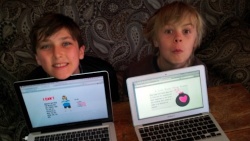
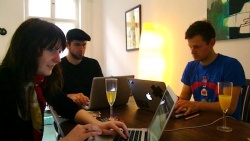
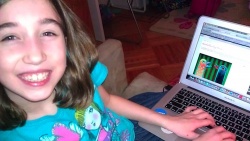 We are looking especially for input from Webmaker Mentors, Maker Party partners and other brave souls.
Your feedback will be incorporated into the Webmaker core offering and used to help people all over the world run learning & making events in their homes, schools and everywhere.
Interested in other pages about QA testing for Webmaker?
We are looking especially for input from Webmaker Mentors, Maker Party partners and other brave souls.
Your feedback will be incorporated into the Webmaker core offering and used to help people all over the world run learning & making events in their homes, schools and everywhere.
Interested in other pages about QA testing for Webmaker?
April 17
Test: Playtest & Design Webmaker Mentor badge
- playtesting draft 1 of your "Remix" Kit (kitchen table)
- Mentor Badge
- Criteria
- Naming of the badges (e.g. 'Mentor')
- How it fits with contribution pathways
- Design
Prompt
- Complete the Badge Canvas for the Webmaker Mentor badge: http://www.digitalme.co.uk/assets/pdf/DigitalMe-Badge-Design-Canvas.pdf
- Make a testimonial tweet for a qualified mentor. Make to "test" badging process in a simple way, tagged as a campaign. https://scott.makes.org/thimble/helping-to-make-a-million-mozillians

April 24
Design Challenge: Building Kits in Lo-Fi and Offline Places
- Design Challenge: How can we empower educators to teach the web using peer-to-peer methods in regions where computers and web connectivity aren't a given?
- We've built a Design Canvas to help makers prototype Webmaker Teaching Kits together on paper before going online, and we'd like you to try it out and tell us what works and what doesn't. We'd also like your help building a new Lo-Fi Teaching Kit!
How to get involved
- Provide feedback on how the Canvas worked for you.
- Join us and help author the Lo-Fi kit from your own experience.
- Or help translators like Alvar by remixing the Activity in your own language! When finished, share with @Webmaker on Twitter.
May 1
Test: Review and Issue the Mentor badge
Prompt
May 8
Test: Translate key teaching kits.
Prompt
May 15
Test: Reflection on whole profess
Prompt
May 10: MASSIVE TRAINING
- May 10: Run Module 1 Exploring -->
- May 15: Run Module 2 Building -->
- May 22: Run Module 3 Facilitating --> Playtesting
- May 28: Run Module 4 Connecting --> Doing it for real
- Test: forkability
Archived Tests
March 13
Test: What is a Super Mentor?
Super Mentors are the backbone and leadership circle of the Webmaker community. Yet, we currently don't have formal support structures nor pathways describing what Super Mentors do and how to become one.
We'd like to have a community consultation about Webmaker Super Mentors.
In particular, we'll look at:
- the skills and experience that make a good Super Mentor (criteria)
- how one demonstrates they are a Super Mentor (evidence)
- the organizational and peer support needed to active, train and celebrate Super Mentors
Do: Here's how you can help
- 1. Take a look at this document. It describes a proposal for Super Mentors. Respond in the document with your thoughts!
- 2. For a fun, hands-on version, remix this make to explain what you think a Super Mentor is and does.
- 3. Share your responses on the Webmaker community call or on the Webmaker mailing list.
Results
Read the findings about what is a Super Mentor.
Summary:
- In general, there's was a lot of support for the skills, experiences and support we identified for Webmaker Super Mentors.
- Training, badging and decision making were key ways that people identified as good for Super Mentors.
- There is some discussion around:
- Web literacy. How much does a Super Mentor need to know? Do they need to know about tools beyond Webmaker, like Scratch, Arduino, etc.? Consensus seems that those are great to have, but not essential.
- Pedagogy. This term was a flashpoint. It resonated with some people and not others. It's been reframed now as Super Mentors are very knowledgeable and experienced in how people learn and strategies to teach skills to others.
- Recognition. We don't have a clear and good way to recognize Super Mentors. Profiles on webmaker.org didn't seem adequate or interesting to most.
March 20
Test: Webmaker Training Exploring Module
- Webmaker Training is a modular, remixable offering designed to teach people our pedagogies, web literacy skills and competencies, real world community building, and global engagement. Here's our Training Roadmap.
- The Exploring Module: Are you up to speed with the foundations behind Webmaker? Can you name the pedagogies behind Webmaker? Do you know why they matter? Come interact with the remixed, revised learning content around the theories underpinning Webmaker and let's see what we learn about the structure of this module.
Do: Here's how you can help
Do one or more of the following and share your thoughts!
- Read this article and then scroll down to the bottom of the page and click to "Join the Conversation". You'll be taken into Discourse, a new type of forum. Join the discussion, add your thoughts. Please beware this is active development, so we can't promise we'll save all your posts (though we'll certainly try!)
- Click on Make and make something (or if you've already made something that you think fits, share that!). Again, at the bottom of the page, click "Conversation", share what you make, see and comment on what others have made.
- Encourage others to remix, make and share, both in the Discourse and in public. Perhaps you have a local community you would like to get involved? Share this wiki with them!
- Spend some time reflecting on the experience of interacting with your peers and this content. What was hard? What did you like? Did you feel like you were part of a community? Did you learn something? Did you have ideas for design, images, or text that would make this easier to learn with?
- Share your thoughts (and your makes!) in the Community Call, on the Webmaker list, through a blog post - however you like! Just make sure we know about it ;)
- The best makes from testing will serve as examples for the mega-meta-May launch.
March 27
Test the Web Literacy Mapper and Finding Great Resources
The Web Literacy Mapper is a bookmarklet that allows you to tag resources from around the web with the competencies from the Web Literacy Map (https://webmaker.org/literacy). We imagine people using it in a similar way that they might use a bookmarklet from Delicious, Pinterest or Diigo - but specifically focused on web literacy-related resources useful for teaching the web.
Here's what you should do
- You can currently access the WebLitMapper here: http://weblitmapper.webmakerprototypes.org
- This 2-min video should help: https://www.youtube.com/watch?v=iy6GkRzEuWA
- Share your experiences and feedback on this etherpad: https://etherpad.mozilla.org/weblitmapper-feedback
Results
Lots of great feedback and issues raised on GitHub!
- Many, many resources related to the Web Literacy Map added to the [WebLitMapper](weblitmapper.webmakerprototypes.org)
- 20+ issues [raised on GitHub](https://github.com/toolness/weblitmapper/issues)
- Great qualitative feedback via the [WebLitMapper feedback etherpad](https://etherpad.mozilla.org/weblitmapper-feedback)

April 3 (#1)
Test the Webmaker Training Building Module (part 1)
- Webmaker Training is a modular, remixable offering designed to teach people our pedagogies, web literacy skills and competencies, real world community building, and global engagement. Here's our Training Roadmap.
- The Building Module: Do you know what you want to teach? Can you use Webmaker tools to build learning resources? Do you know how to design participatory activities? Work with individuals in the Webmaker community to design and prototype a teaching kit using paper prototyping, then share what you made!
Here's what you should do:
Do one or more of the following and share your thoughts!
- Read this article and share your thoughts.
- Click on Make and outline your learning objectives. You might like to do paper brainstorming by remixing this.
- Next, try to write participatory activities that address your learning objectives. Use the Activity Template or do Paper Prototyping!
- Encourage others to remix, make and share
- Think about and answer one (or more!) of these questions
- Share the entire experience in the Community Call, on the Webmaker list, through a blog post - however you like! Just make sure we know about it ;)
- The best makes from testing will serve as examples for the mega-meta-May launch.
April 3 (#2)

Test the draft Web Literacy alignment resources
Now that the Web Literacy Map is at version 1.1.0 it's time to help people start to align with it. We've started work on two resources: a wiki page and a Web Literacy 'canvas'.
We're sharing this very early in the development process so you can help shape it to become a really helpful resource for anyone who wants to teach the web!
Here's what you should do:
- Read through the How to align with the Web Literacy Map wiki page
- Try using the Web Literacy canvas (either by printing or by making a copy of the Google Doc)
- Add comments to the feedback etherpad
April 10
Test the Webmaker Training Building Module (part 2)
- Webmaker Training is a modular, remixable offering designed to teach people our pedagogies, web literacy skills and competencies, real world community building, and global engagement. Here's our Training Roadmap.
- The Building Module: Do you know what you want to teach? Can you use Webmaker tools to build learning resources? Do you know how to design participatory activities? Work with individuals in the Webmaker community to design a teaching kit based on your paper prototype, then share what you made!
Here's what you should do:
Do one or more of the following and share your thoughts!
- Read this article and share your thoughts.
- Click on Make Take your paper prototype from last week and put it into Thimble as a Teaching Kit, or if you didn't make a prototype, outline your learning objectives with the new Kits. Focus on trying out the new UX features/additions.
- Next, try to write participatory activities that address your learning objectives. Plug your prototypes into the Activity Template or, if you didn't make a prototype, you might like to try it: Paper Prototyping!
- Encourage others to remix, make and share
- Think about and answer one (or more!) of these questions
- Share the entire experience in the Community Call, on the Webmaker list, through a blog post - however you like! Just make sure we know about it ;)
- Your activities may be included in the 'official' Webmaker "Remix" kit we're building!
